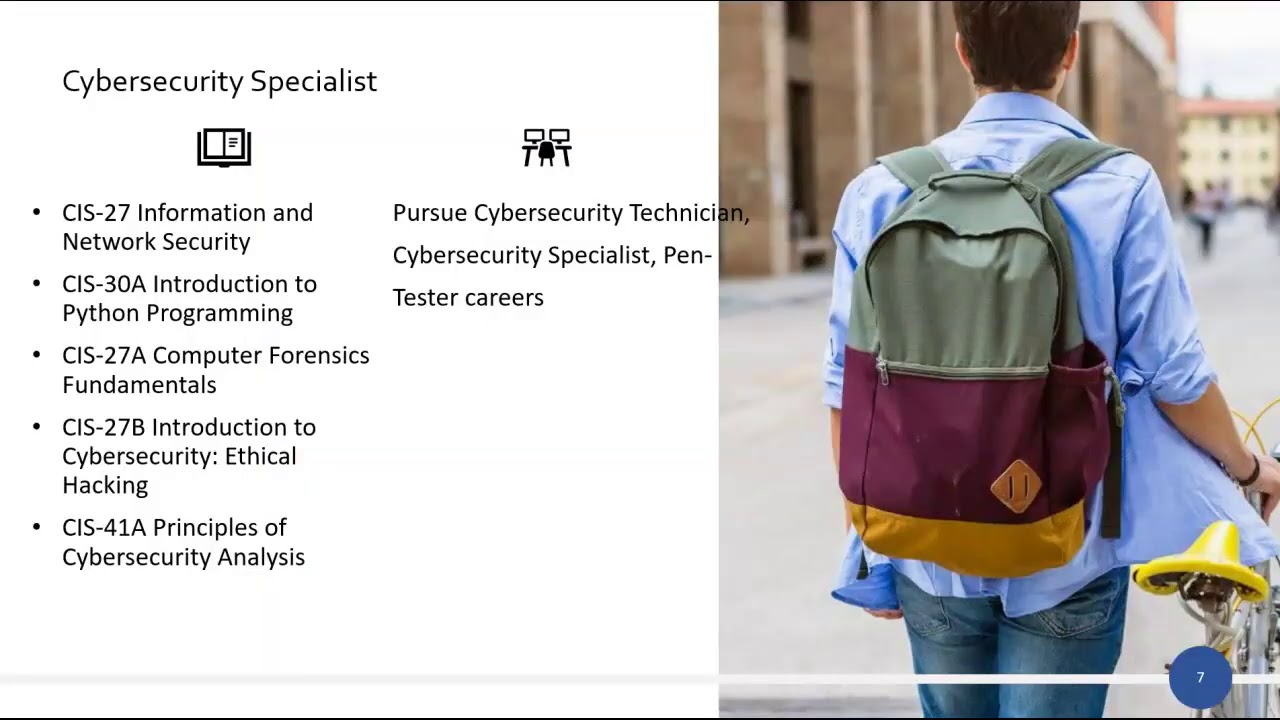
Cybersecurity
Make a career out of creating a secure digital ecosystem
Cyber security relates to the methods used to protect computers, networks, programs and data from unauthorized access or attacks that are aimed for exploitation. At MVC, students have excellent opportunities to upgrade their technical skills, seek training for industry certifications, and examine career options in the cybersecurity field.
Programs of Study
Cybersecurity programs are part of MVC's IT Technician Pathway. For additional degree and certificate options related to this pathway, review degree and certificate options for Information Technology and Computer Programming.
-
BBachelors Degree
-
AAssociate Degree
-
TTransfer Degree
-
CCredit Certificate
-
NNon-Credit
-
Limited Enrollment
-
Online Options
-
Zero Textbook Cost
The Cybersecurity associate degree aims to increase diversity in the technical workforce. Students that pursue this program of study learn how to apply security principles and countermeasures to protect information systems against threats; evaluate technical issues and derive solutions to address security gaps; and plan, design and implement security controls to reduce risks in information systems.
Students are provided a transfer pathway to a university, such as California State University, San Bernardino, to further pursue education and training in cybersecurity.
For specialized training, three additional cybersecurity certificates exist.
Program Code
MAS1012
The IT Technician Pathway Certificate in Cybersecurity Analyst provides students with proficiency in security measures, analytical assessment practices and developing plans of systems, network, and applications in alignment with existing systems architectures in order to achieve security goals and objectives.
Program Code
MCE985
The IT Technician Pathway Certificate in Cybersecurity Healthcare Specialist will provide students with proficiency in security measures and practices to protect healthcare systems while ensuring information privacy based on regulatory and compliance requirements.
Program Code
MCE986
The IT Technician Pathway Certificate in Cybersecurity Specialist provides students with proficiency in security measures and practices to protect systems in organizational networks.
Program Code
MCE936

![]()
Apprenticeship Available
This program has paid apprenticeship opportunities available to students pursuing employment in cybersecurity and information technology fields.
More Ways to Learn
Meet Your Faculty
Have questions about the cybersecurity program or courses? Reach out to program faculty or request counseling and advising.
-
 Kasey Nguyen, Ph.D.
Kasey Nguyen, Ph.D.Associate Professor, Computer Information Systems
-
 Phone
Phone(951) 571-6940
Why pursue studies in cybersecurity?
What You'll Learn
- How to apply security principles and countermeasures to protect information systems against threats.
- How to evaluate technical issues and derive solutions to address security gaps.
- How to plan, design and implement security controls to reduce risks in information systems.
- You'll be prepared to pursue the following industry certification exams:
- A+, Network+, Linux+ or LPIC-1, Microsoft MCSA, Security+, CySA+, EC-CEH, Healthcare IT Technician or HCISPP – The HealthCare Security, Palo Alto Networks Certified Cybersecurity Associate (PCCSA)
Career Paths
- Cybersecurity analyst
- Security architect
- Security auditor (internal, external, third-party)
- Vulnerability researcher
- Penetration tester
- Ethical hacker
- Security research engineer
Salaries and Job Outlook
Featured Courses
- About this course: An introduction to the fundamental principles and topics of Information Technology Security and Risk Management at the organizational level. It addresses hardware, software, processes, communications, applications, and policies and procedures with respect to organizational Cybersecurity and Risk Management. Also includes preparation for the CompTIA Security+ certification exams.
- Credits: 3 units
- Transfers to: California State Universities
- About this course: An introduction to network architecture, functions, components, and models computer networks. The principles and structure of IP (Internet Protocol) addressing and the fundamentals of Ethernet concepts, media, and operations are introduced to provide a foundation for further study of computer networks. It explores the OSI (Open Systems Interconnection) and TCP (Transmission Control Protocol) layered models to examine the roles of protocols and services networking models. Preparation for the CompTIA Network+ certification exam.
- Credits: 3 units
- Transfers to: California State Universities
- About this course: Build, maintain, troubleshoot and support server hardware and software technologies. Focuses on network operating system administration concepts, structure, functions, performance, and resource management is covered. Current desktop and server operating systems, such as Windows, Linux or UNIX, Mac OS are explored in this course. File and storage management techniques, system security measures, device management, and utilities in network administration and technical support procedures are examined in this course. The students will be able to identify environmental issues; understand and comply with disaster recovery and physical / software security procedures; become familiar with industry terminology and concepts of incident handling; understand server roles / specializations and interaction within the overall computing environment.
- Credits: 3 units
- Transfers to: California State Universities
- About this course: Introduces the critical knowledge and skills that are required to prevent, detect, and combat security threats and includes the application of behavioral analytics to improve the overall state of IT security in organizations. Provides concepts for network vulnerability and threat assessment, analysis of security policies and procedures in accordance to frameworks and compliance, and responsive approaches to handle security incidents. Preparation for CompTIA Cybersecurity Analyst certification (CySA+).
- Credits: 3 units
- Transfers to: California State Universities